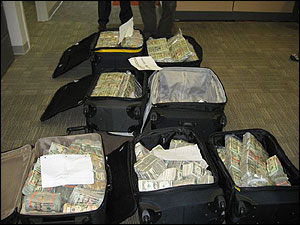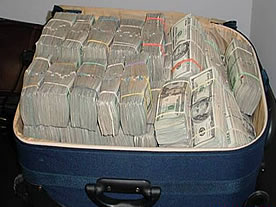Was your gambling money seized at the airport? Were you flying to or from a casino? Had you just participated in a tournament or were you heading to one? Can you obtain copies of your win/loss records or player’s club records? Do you have credit card transactions at casino resorts for accommodations, food, or entertainment?
No Attorney Fee/Costs
in Cash Seizure Cases Unless We Recover Money
We help people recover money in Federal civil forfeiture claims.
Brian Silber is a defense attorney who focuses on Federal civil asset forfeiture. He is a former prosecutor, a graduate of the University of Miami, and has been practicing law for nearly 20 years. His law practice focuses on civil asset forfeiture defense in federal jurisdictions across the country.
When Gambling Money is Seized at the Airport
Is it illegal to fly with cash?
No, there is nothing illegal about flying with cash. You are free to travel with as much or as little as you like.
Think about it: Have you ever heard of someone getting arrested at the airport for possession of too much cash? No, because it isn’t illegal.
However, if the money has an unlawful source or an illegitimate purpose, it may be subject to forfeiture. Transacting with “contraband money” may also create criminal liability, depending on the circumstances.
Was I supposed to declare $10,000+ in cash?
The requirement to declare $10,000+ ONLY applies when crossing the border into or out of the United States. It does NOT apply to domestic travel. Domestically, there is no reporting requirement.
How Do I Get My Money Back?
Tell us what happened!
Gambling money seized at the airport is a common case type. This is because casino players always travel with cash. It is part of casino life. Casino winnings are defensible because there is always a paper trail. We want to trace back your cash winnings to the casino you won them at. We want to show where you won the money, when you won the money, and how much. We also want to show you have an established history of gambling at casinos as opposed to a one-time event.
But first, we must find out what happened:
- Did you travel on a one-way ticket?
- Did you buy your ticket within 24-48 hours of travel?
- Were you detained at the gate?
- Did they call you out by name?
- Did TSA screeners find money in your bags?
- Were you flying to/from a cannabis legal state?
- Were you on an international flight?
- Did you fail to declare $10,000+ cash when entering/leaving the US?
- Did you check any bags?
- Are you male, 18-40 years old?
- Do you have a criminal record?
- Did a K9 “alert” to your money or bags?
- Did you consent to any searches?
- Did you sign anything?
- Did you give a statement to law enforcement?
- Which airport was your money seized at?
- What date was your money seized?
- How much money was taken from you?
Next, we scour your case for legal issues that we may be able to use, to attack the prosecution’s case:
- No probable cause for forfeiture under federal law
- Excessive fines violation
- Unlawful search and seizure
- Illegal stop and detention
- Innocent owner defense
- Innocent buyer/seller for value
- Innocent bailor/bailee
- Unlawful interrogation
- Unreliable K9 evidence
- Proof of legitimate source
- Proof of legitimate use/intended use
- Failure to send timely notice
- Deadline violations
Notice of Seizure for
Gambling Money Seized at the Airport
Due Process always begins with notice. The purpose of notice is to inform people that their rights are being effected so that they can take action.
Federal law enforcement has a 60 day deadline to send you notice of seizure. This notice explains your rights and gives you key information. This deadline can be extended in limited conditions.
The notice will specify Federal laws that the Government relies upon to justify forfeiture of your money. Most importantly, the notice specifies deadlines to file a claim or take other action.
Making a Winning Claim
for Gambling Money Seized at the Airport
We attack a forfeiture from two sides. First, we want to see what the evidence tells us. What does the Government’s best day in court look like? What does ours? Where are we weak, where are we strongest?
We also look at the law.
Not only do we attack a case on the evidence, but we also attack it on the law. For example, we may file a motion to suppress in court to stop prosecutors from using evidence that was illegally seized by police.
Common Defenses Include:
- Conflicting, Inadequate, or Unreliable Evidence
- Excessive Fines Violation
- Illegal Search and Seizure
- Inadmissible Character Evidence
- Inadmissible Hearsay
- Inadmissible or Unreliable Expert Testimony
- Inadmissible or Unreliable K9 Evidence
- Innocent Owner Defense
- Lack of Nexus Defense
- Proof of Legitimate Source
- Proof of Legitimate Use or Intended Use
- Statute of Limitations Violation
- Unlawful Interrogation
If your gambling money was seized at the airport, call us for a free initial consultation.
Question? Contact Us!
Updated 08-24-2021
